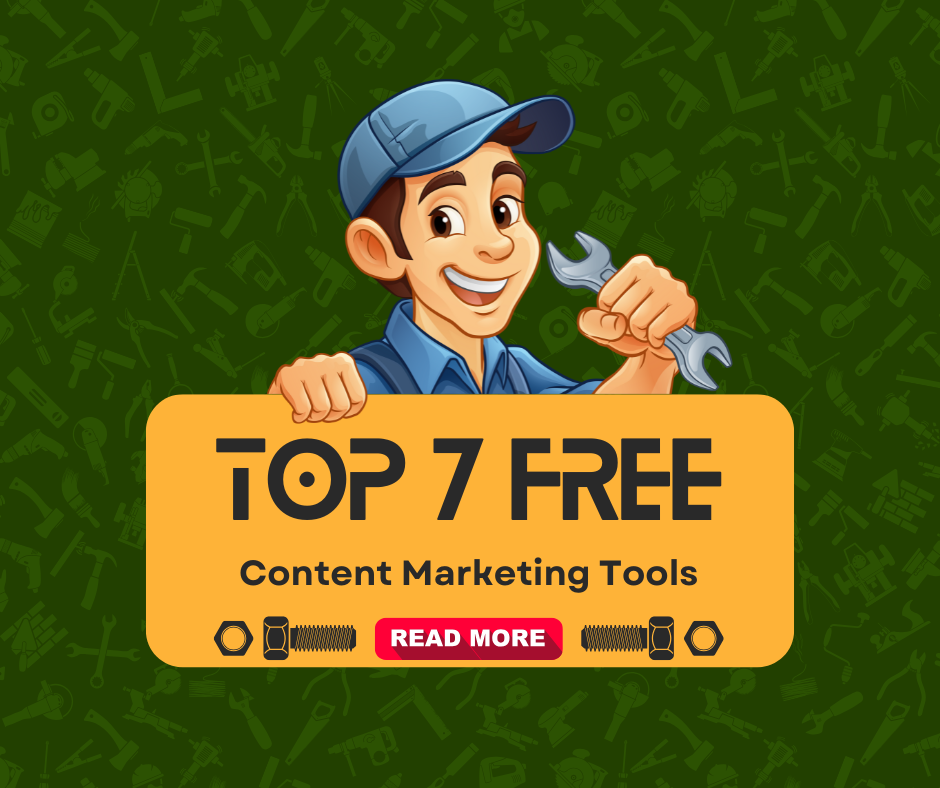Top 7 Free Content Marketing Tools Every Content Marketer Should Use
Introduction
Finding the right free content marketing tools can transform your marketing strategy without breaking your budget, especially for small businesses and solo entrepreneurs just starting their content journey. In today’s competitive digital landscape, content marketers need powerful tools to create engaging content, optimize for search engines, design eye-catching visuals, and analyze performance metrics to drive meaningful results.
The challenge lies in identifying which tools actually deliver professional-grade capabilities without the premium price tag. Many free tools offer limited features or come with significant restrictions, making it crucial to choose platforms that provide genuine value and can scale with your growing content needs.
This comprehensive guide reveals seven essential free content marketing tools that successful marketers rely on daily, along with practical tips for maximizing their potential to create, optimize, and distribute content that drives engagement and conversions across all marketing channels.
What Are Free Content Marketing Tools and Why Do They Matter?
Free content marketing tools are software platforms and applications that help marketers create, optimize, distribute, and analyze content without requiring paid subscriptions or premium upgrades for essential features. These tools democratize access to professional marketing capabilities, enabling businesses of all sizes to compete effectively in the digital marketplace.
Unlike their paid counterparts, quality free content marketing tools provide core functionalities that cover the entire content marketing workflow, from initial research and creation through distribution and performance analysis. The best free tools often include generous usage limits, comprehensive feature sets, and integration capabilities that rival expensive premium alternatives.
The significance of these tools extends beyond cost savings. They allow new marketers to experiment with different strategies, learn essential skills, and prove ROI before investing in premium solutions. Many successful content marketing campaigns have been built entirely on free tools, demonstrating that budget constraints don’t have to limit creative potential or marketing effectiveness.
For established businesses, free tools serve as excellent supplements to existing marketing stacks, providing specialized capabilities for specific tasks or serving as backup solutions. Understanding which free content marketing tools deliver the most value helps marketers make informed decisions about resource allocation and strategy development.
7 Essential Free Content Marketing Tools Every Marketer Needs
1. Canva – Visual Content Creation Made Simple
Canva revolutionizes visual content creation with its intuitive drag-and-drop interface and extensive library of templates, images, and design elements. The free version provides access to thousands of professional templates for social media posts, blog graphics, presentations, and marketing materials.
Key features include custom brand kit creation, photo editing capabilities, and collaboration tools for team projects. Canva’s template library covers every major social platform and content format, ensuring your visuals maintain professional quality across all marketing channels.
2. Google Analytics – Comprehensive Website Performance Tracking
Google Analytics remains the gold standard for website analytics, providing detailed insights into content performance, user behavior, and conversion tracking. The free version offers enterprise-level capabilities including real-time reporting, audience segmentation, and goal tracking.
Set up custom dashboards to monitor content metrics that matter most to your strategy, track user journeys through your content funnel, and identify high-performing content types. Integration with Google Search Console provides additional SEO insights for content optimization.
3. Hootsuite (Free Plan) – Social Media Management and Scheduling
Hootsuite’s free plan allows management of up to three social media profiles with 30 scheduled posts per month, making it perfect for small businesses and individual marketers. The platform supports major social networks including Facebook, Twitter, Instagram, and LinkedIn.
Features include content scheduling, basic analytics, and team collaboration tools. The unified dashboard streamlines social media management, allowing you to maintain consistent posting schedules and engage with audiences across multiple platforms efficiently.
4. Grammarly – Content Quality and Grammar Checking
Grammarly ensures your content maintains professional quality with advanced grammar checking, style suggestions, and readability improvements. The free version catches common errors and provides clarity suggestions that enhance content effectiveness.
The browser extension integrates seamlessly with content management systems, social media platforms, and email clients, providing real-time writing assistance across all your content creation workflows. Premium features include plagiarism detection and advanced style recommendations.
5. Ubersuggest – SEO Research and Content Optimization
Ubersuggest provides essential SEO research capabilities including keyword analysis, competitor research, and content ideas generation. The free version offers limited daily searches but includes valuable metrics like search volume, keyword difficulty, and SERP analysis.
Features include domain overview analysis, backlink data, and content gap identification. Use Ubersuggest to discover trending topics in your industry, analyze competitor content strategies, and identify opportunities for content optimization and creation.
6. Mailchimp (Free Tier) – Email Marketing and Automation
Mailchimp’s free tier supports up to 2,000 contacts and 10,000 monthly email sends, making it suitable for growing businesses and content marketers building their email lists. The platform includes drag-and-drop email builders, basic automation, and performance analytics.
Key features include landing page creation, signup forms, and basic segmentation capabilities. Mailchimp integrates with popular content management systems and social media platforms, enabling seamless content distribution across multiple channels.
7. Buffer (Free Plan) – Social Media Scheduling and Analytics
Buffer’s free plan allows scheduling for up to three social media accounts with 10 scheduled posts per account, providing essential social media management capabilities for content marketers. The platform supports major social networks and includes basic analytics.
Features include optimal posting time recommendations, hashtag suggestions, and simple performance tracking. Buffer’s clean interface and reliable scheduling make it an excellent choice for maintaining consistent social media presence without overwhelming complexity.
Advanced Tips and Integration Strategies
Maximizing the potential of free content marketing tools requires strategic integration and workflow optimization. Create content calendars that leverage multiple tools simultaneously – use Ubersuggest for keyword research, Canva for visual creation, Buffer for social scheduling, and Google Analytics for performance tracking.
Develop template libraries in design tools like Canva to maintain brand consistency across all content types. This approach streamlines content creation while ensuring professional appearance regardless of who creates the content or which platform it’s designed for.
Consider tool stacking strategies where free tools complement each other’s limitations. For example, combine Hootsuite’s scheduling capabilities with Buffer’s analytics features, or use Grammarly’s editing tools alongside Canva’s design capabilities for comprehensive content creation workflows.
API integrations and automation tools like Zapier can connect different free tools, creating automated workflows that save time and reduce manual tasks. These integrations help free tools function more like comprehensive paid platforms while maintaining cost effectiveness.
Common Mistakes When Using Free Content Marketing Tools
One of the most frequent mistakes marketers make is trying to use every available free tool instead of focusing on a core set that covers essential needs effectively. Tool overload leads to scattered workflows, inconsistent branding, and reduced productivity rather than enhanced marketing capabilities.
Many users fail to fully explore the capabilities of free tools before seeking premium alternatives, missing valuable features and optimization opportunities. Most free content marketing tools offer extensive functionality that remains underutilized due to insufficient exploration and training.
Another common error involves neglecting proper tool integration and workflow development. Using tools in isolation reduces their effectiveness and creates unnecessary duplication of effort. Successful content marketers develop systematic approaches that leverage multiple tools cohesively.
Ignoring usage limits and restrictions can lead to unexpected service interruptions or feature limitations at critical moments. Understanding each tool’s constraints helps with proper planning and prevents workflow disruptions during important campaigns or deadlines.
Finally, many marketers don’t establish proper measurement and optimization processes for their free tools, missing opportunities to improve performance and demonstrate ROI. Regular analysis and optimization ensure maximum value from free tool investments.
Frequently Asked Questions
Q: Can free content marketing tools really replace paid alternatives? A: For many small businesses and individual marketers, free tools provide sufficient functionality to execute effective content marketing strategies. However, scaling operations or accessing advanced features may eventually require premium upgrades.
Q: What are the main limitations of free content marketing tools? A: Common limitations include usage caps, reduced feature sets, limited customer support, and restrictions on team collaboration. However, these limitations often don’t impact core functionality for smaller operations.
Q: How do I choose which free tools to use for my content marketing? A: Start by identifying your primary content marketing needs – creation, distribution, or analysis – then select tools that best address those priorities. Focus on 3-5 core tools rather than trying to use every available option.
Q: Are free content marketing tools secure for business use? A: Reputable free tools like those mentioned in this guide maintain professional security standards. However, always review privacy policies and terms of service, especially when handling sensitive business information.
Conclusion
The seven free content marketing tools outlined in this guide provide everything needed to launch and maintain effective content marketing campaigns without significant financial investment. From visual content creation with Canva to performance tracking with Google Analytics, these platforms offer professional-grade capabilities that can compete with expensive premium alternatives when used strategically.
Success with free content marketing tools depends on understanding each platform’s strengths, developing integrated workflows, and focusing on tools that directly support your specific marketing objectives. Rather than trying to use every available free tool, concentrate on mastering a core set that covers your essential content creation, distribution, and analysis needs.
The key to maximizing these tools lies in consistent usage, proper integration, and ongoing optimization based on performance data. Start with these seven essential platforms, develop systematic workflows that leverage their combined capabilities, and scale your tool stack as your content marketing needs evolve. With the right approach, free tools can power sophisticated content marketing strategies that drive real business results and competitive advantage in your market.
External Reference: For additional insights into content marketing best practices and tool selection, visit the Content Marketing Institute for industry research, case studies, and expert guidance on building effective content strategies.
What Is On-Page SEO? Complete Guide to Best Practices for Beginners Read More.






